Books, Courses & Certifications
14 Marketing Certifications That Can Help Boost Your Earnings

The Gist
- Career impact. Marketing certifications can significantly increase salary and career advancement opportunities.
- Skill enhancement. Certifications help marketers stay current with industry trends and technologies, such as AI and analytics.
- Accessibility. Many valuable marketing certifications are self-paced, online and available for free.
Editor’s Note: This article was updated on September 19, 2024 to include new data and information. The original content was authored by Scott Clark.
Marketing certifications are in demand in many industries. Employers use certifications as a sign that an applicant has the necessary knowledge and skills for the job. Even experienced digital marketing specialists use certifications as a way to demonstrate their commitment to keeping skills current.
Are Digital Marketing Specialists in High Demand?
Marketing specialists are in high demand, and that’s not expected to change in the next 10 years.
The job market for marketers is growing faster than average, according to the Bureau of Labor Statistics, which predicted nearly 75,000 new marketing jobs to open up between 2023 and 2033. That’s faster than the average job growth for all occupations.
Marketing professionals, such as market research analysts, can expect to make around $74,000 per year. A marketing manager, on the other hand, can expect to make $156,580 per year or $75.28 per hour.
Many of these option positions require only a Bachelor’s degree, however some will ask for a Master’s degree. Marketing certifications are a great way to fill in the gaps of your knowledge and show organization’s that you’re interested in keeping your skills up-to-date.
Is a Marketing Certification Worth the Money?
According to Robert Half Technologies’ 2024 Salary Guide, an entry-level Marketing Manager with no certifications can expect to earn $79,500 per year. An experienced, certified Marketing Manager earns approximately $111,000. That’s a difference in earnings of over $31,000.
Recent graduates often question whether certifications are worth paying for. The average price of public, in-state university tuition is $10,662 per year, according to US News.
However, some of the certifications we list here are offered free of charge.
The cost of a premium certification program varies from a few hundred dollars to a few thousand. Still, these courses can be completed quite quickly and have the potential to offer a significant increase in earnings.
Related Article: The 8 Most Popular Types of Digital Marketing
The 14 Best Certifications for Marketing Professionals
Certifications are an effective way for candidates to show competency in key skills or the use of common marketing tools. In many industries, digital marketing certifications have become job prerequisites and requirements for promotion.
In this article, we’ll look at some of the most in-demand certifications available for marketing professionals, including:
1. Digital Marketing Strategies: Data, Automation, AI & Analytics
The two-month-long Digital Marketing Strategies: Data, Automation, AI & Analytics is offered by the Kellogg School of Management at Northwestern University. It’s ideal for digital marketers who want to better understand the digital-centric behaviors of consumers.

The course includes eight modules, which covers topics like:
- Customer segmentation
- Behavioral insights
- The customer journey
- Content marketing
- Brand storytelling
- Marketing automation
- Artificial intelligence in marketing
The course costs $2,750, with a payment plan available, and is offered entirely online. Testing is a rigorous process, and you’ll need to achieve at least an 80% success rate to pass. Professionals who pass the course will earn a verified digital certification.
2. Professional Digital Marketing Course + PCM Advanced Digital Marketing
The Professional Digital Marketing Course from the Digital Marketing Institute is offered in combination with the PCM Advanced Digital Marketing course from the American Marketing Association.
This professional development program is entirely online and includes access to various templates you can put to use in your marketing career, calendars to help you manage campaigns, AI tools, AI prompt guides and more.
This digital marketing pro course covers key skills like:
- Social Media Marketing
- Search engine marketing
- Paid Search (PPC) using Google Ads
- Email Marketing
- Analytics with Google Analytics 4 (GA4)
- Digital Marketing Strategy
According to the Digital Marketing Institute and American Marketing Association, graduates with this marketing certificate see a number of career benefits — such as an average of $12,000 salary increase. The groups also claim that 79% of graduates received a promotion within six months of completing the course.
The cost of enrollment for these certification programs (as a bundle) is $2,060. Once you complete the course, you’ll earn a globally recognized certification and gain access to the DMI Network, which includes more than 300,000 marketing industry professionals.
3. Google Digital Marketing & Ecommerce Professional Certificate
This Digital Marketing & Ecommerce Professional Certificate offered by Google covers the in-demand skills you’ll need to learn for a career in digital marketing — and you can learn it all at your own pace.
This credential includes seven courses and is ideal for beginners. It will take around six months to complete when dedicating 10 hours per week. Those who finish the certificate program can earn a degree credit.
Topics covered in the course include:
- Strategies to build brand awareness and customer loyalty
- How to optimize content for SEO
- Core pillars of social media marketing
- Where email marketing fits into the digital marketing strategy
- How to evaluate marketing metrics against performance goals
- How to build, launch and manage ecommerce stores
- How to successfully manage the customer experience online
4. The OMCP Digital Marketing Certification
The Online Marketing Certified Professional (OCMP) Digital Marketing Certification is unique in that it’s only awarded to those with verified marketing experience. The traditional route of certification requires a passing score on the OMCP exams as well as 5,000 hours of experience.

OMCP digital marketing certification covers a number of marketing disciplines, including:
- Social media marketing
- Digital analytics
- Paid search
- Mobile marketing
- Conversion rate optimization
- Email marketing
It’s free to create an account with OMCP, after which you can set goals for certification and track your status. To earn the Digital Marketing Certification, you’ll need to pass two specialty exams and one broad digital marketing exam. The cost for all three exams is $395.
Once you pass the exams, OMCP certification is valid for two years. After which, you can extend your certification by participating in recognized events or training programs or by passing another OMCP exam.
Related Article: 21 AI Applications to Explore for Marketing, Customer Engagement
5. Google’s Fundamentals of Digital Marketing
The Fundamentals of Digital Marketing certification is offered by Google and accredited by Interactive Advertising Bureau. It’s ideal for those looking to learn foundational skills in digital marketing that will help you achieve long-term career growth.
The course consists of 24 modules that cover topics like:
- Building your web presence
- Search engine optimization (SEO)
- Social media marketing strategy
- Content marketing
- Display advertising
- Getting started with digital analytics
- Building your ecommerce shop
This free course takes approximately 14 hours to complete, though there is no time limit. Learners can access the content at any time and everything is self-paced.
Once you complete all the modules — including a final assessment — Google will provide you with what it calls an “award,” which you can showcase on LinkedIn.
6. Content Marketing Institute’s Master Class Certification
This Content Marketing Master Class from Content Marketing Institute covers 11 core modules, along with additional content on the latest trends and strategies from top industry leaders. Each module includes a video that learners can watch at their own pace, followed by a short quiz.
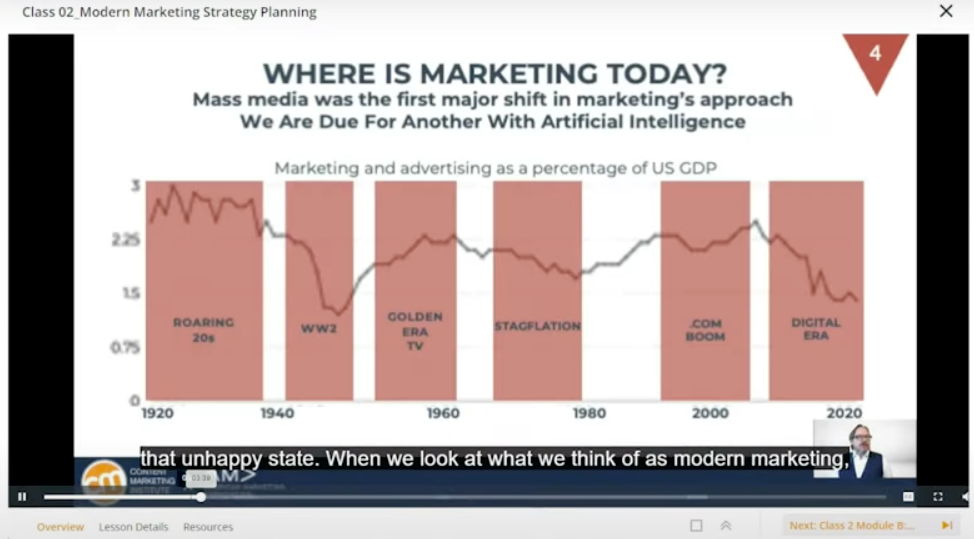
This master class covers key skills and topic areas like:
- Building audience trust
- The three pillars of content marketing strategy
- The primary charters of a content team
- Developing customer-centric content marketing standards
- Developing audience personas
- The four archetypes of content
- How to measure content marketing efforts
This course is ideal for the digital marketing specialist looking to grow in the area of content marketing, or content marketers who want to expand their skill set. It’s self-paced and costs $1,395 (or $1,295 for AMA members). Once you sign up, you’ll have access to the course and training materials for 12 months.
7. The SMEI Certified Professional Marketer Course
Sales & Marketing Executives International, known as SMEI, offers the SMEI Certified Professional Marketer (SCPM) Exam Preparatory Course.
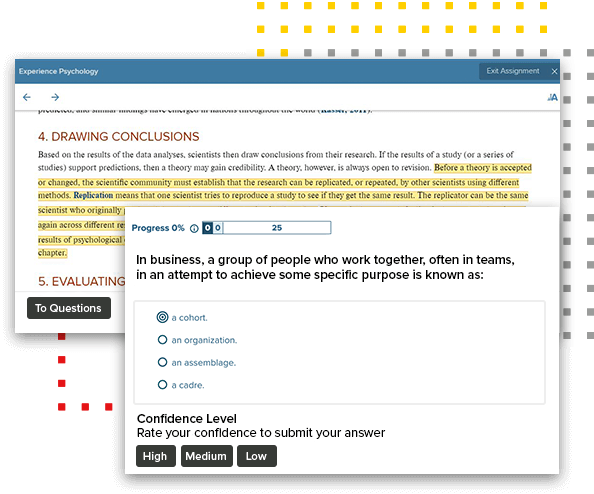
This course includes four parts and 18 total modules, with topics covered including:
- Creating customer relationships
- Understanding consumer behavior
- Reaching global customers and markets
- Managing successful products, services and brands
- Market segmentation and targeting
- Implementing interactive and multichannel marketing
- Using social media marketing and mobile marketing to connect with customers
The price of this marketing certificate course is $989 and includes access for six months. Those who get a grade of 75% or higher on the certification exam will receive the SCPM credential as well as a verifiable digital badge that you can share on LinkedIn or in your email signature.
The SMEI certifications may be of interest to individuals who are looking to move into senior management roles. Managers need an understanding of all marketing channels, PR and market research. The SMEI course covers these topics better than vendor-specific digital marketing courses would.
8. UC Berkeley Extension Certificate Program in Marketing
The UC Berkeley Extension Certificate Program in Marketing is a college-level certification program. It promises to teach students everything they need to know to become a digital marketing expert.
The program, which costs an estimated $4,700, includes 150 hours of instruction and is typically completed within two years. There is no prerequisite for this certification program, though a bachelor’s degree is recommended.
Skills that are taught include:
- Marketing management
- Social media marketing strategy
- Managing product and go-to-market strategies
- Marketing data visualization
- Strategic brand management
- Paid digital advertising
The courses within this marketing certificate are available online and in the classroom. All coursework must be completed within five years with a completed grade of C or better to earn certification.
9. Google Ads Measurement Certification
A number of Google Ads certification programs exist that you can add to your to-do list. One excellent option for marketers is the free Google Ads Measurement Certification, which teaches learners the skills required to measure and optimize digital ad performance.
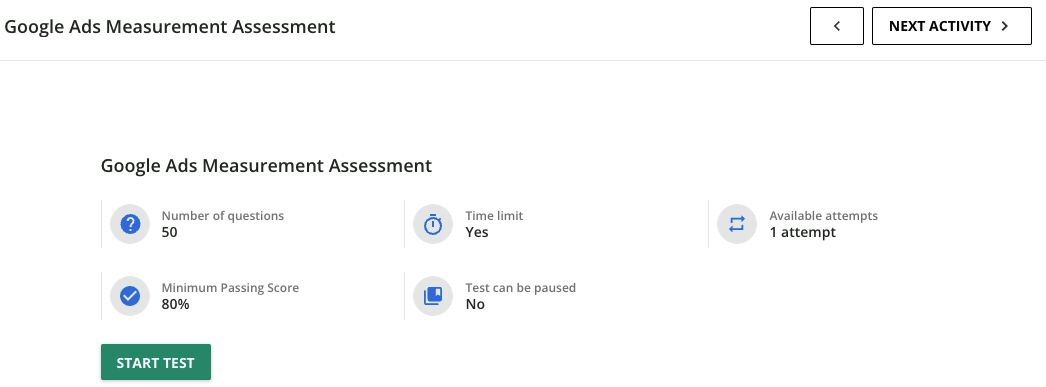
Skills covered include:
- Turning marketing objectives into measurable actions
- Setting up tracking for measuring sales, app downloads, app installs and more
- How to analyze and act on insights from tracking data
- Choosing the right attribution model for your business goals
The course includes four sections and 14 activities, and takes just over three hours to complete. To pass, you’ll need to achieve a score of 80% or higher on the certification assessment. If you don’t pass the assessment, you have the opportunity to retake it a day later.
Other Google Ads certifications offered include:
- Google Ads Apps Certification
- Google Ads Search Certification
- Google Ads Display Certification
- AI-Powered Shopping Ads Certification
- Google Ads Video Certification
Related Article: Conversational AI Brings Google Gemini to Google Ads
10. HubSpot Content Marketing Certification
HubSpot’s Content Marketing Certification course is popular for many reasons, chief among them being that it’s free, well-recognized and comprehensive. HubSpot’s tools are used by many marketing agencies. Marketing specialists should find the skills they learn while studying are highly transferable.
The 12 lessons in this marketing certificate cover topics like:
- The power of storytelling
- Building a content creation framework
- Generating content ideas
- Planning a long-term content strategy
- How to create a successful video marketing strategy
- Creating topic clusters and pillar pages
- How to measure and analyze content
The course consists of 14 lessons, 54 videos and 11 quizzes. It takes approximately 8.5 hours to complete. Once you complete the course, you’ll earn a certification that you can add to your LinkedIn profile. HubSpot’s marketing certificates are valid for two years.
11. Google Analytics Certification
This free Google Analytics Certification is ideal for the digital marketing expert who wants to become a pro at Google Analytics 4. Those who complete the certification will understand how to set up and structure a property, as well as how to use the various reporting tools and features within the platform.
By passing the course, you’ll be able to demonstrate that you can:
- Set up a GA4 property for a website or app
- Collect the data you need for your business
- Use the various reporting tools and features
- Demonstrate the effectiveness of your marketing efforts
This certificate program includes two sections and six activities. It will take around five hours to complete, though you have unlimited access and can work through modules at your own pace.
This program is part of Google’s Skillshop, where they offer a number of certification and e-learning programs for digital marketers. Other certifications available for GA4 include:
- Get Started Using Google Analytics (GA4)
- Manage GA4 Data and Learn to Read Reports
- Dive Deeper Into GA4 Data and Reports
- Use GA4 With Other Tools and Data Sources
12. SEMRush SEO Toolkit Course
If you’re a marketer that wants to become an SEO pro, the SEO Toolkit Course through SEMRush Academy might be the option for you. This course is completely free and is ideal for anyone who wants to gain a better understanding of their competitors’ online presence, including paid search and organic strategies.
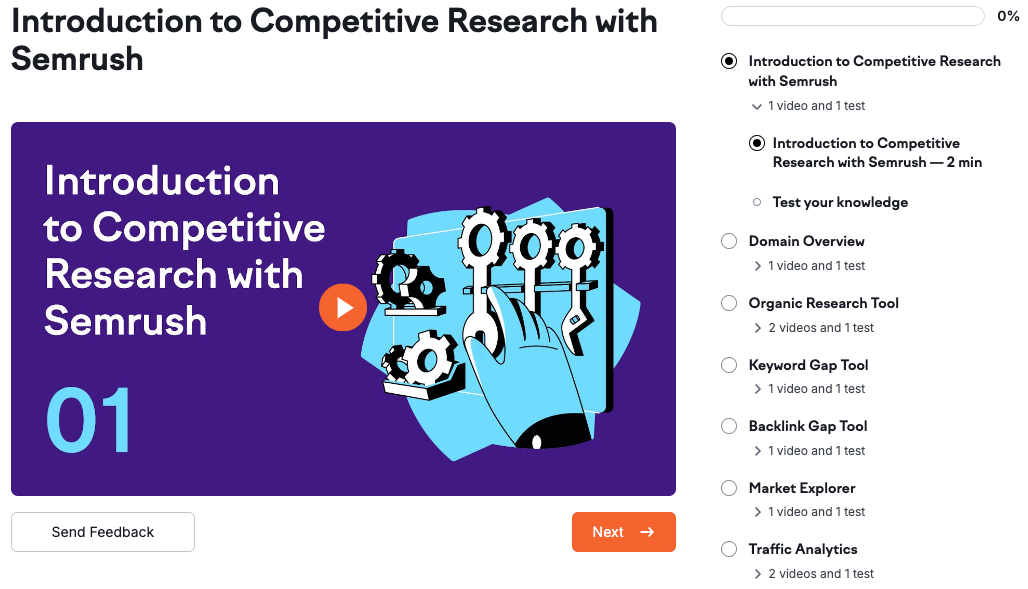
In this course, you’ll take a deep dive on the search engine optimization tools offered by SEMRush, including the:
- Doman Overview tool
- Traffic Analytics
- Organic Research
- Keyword Gap tool
- Backlink Gap tool
This certification program includes nine videos and will take around 45 minutes to complete. Once complete, you’ll have the skills you need to thrive in a position that requires essential SEO knowledge and tool use.
13. HubSpot Social Media Marketing Certification Course
Another option from HubSpot, the free Social Media Marketing Certification course will cover all the fundamentals of building a successful social media strategy. It’s ideal for social media marketers who want to broaden their skillset and marketing managers who want to up-level their digital marketing expertise.
The course covers a variety of skills, including:
- Developing a social media strategy
- Social media listening and monitoring
- Extending your reach on social media platforms
- Using social media profiles to build one-on-one relationships
- Social media advertising
- How to measure your social return on investment
The course includes 10 lessons, 38 videos and 29 videos. On average, it takes users around five hours to complete. Once finished, you’ll earn a certificate that you can share on your LinkedIn profile.
14. Google Think Outside the Box: Email Marketing Course
This Think Outside the Box: Email Marketing Course is part of the Google Digital Marketing & Ecommerce Professional Certificate. However, it can be taken as a standalone course for those who specifically want to brush up on their email skills.
This course covers topics like:
- The types of email marketing
- Useful marketing tools for email
- Collecting and analyzing email campaign data
- How to run your own email marketing campaign
This email marketing course includes five modules, 38 videos, 37 readings, 25 quizzes and six discussion prompts. According to Google, it takes learners approximately 25 hours to complete. Once complete you’ll earn a shareable certificate you can share on your LinkedIn profile. You can also choose to go on and progress towards a full professional certificate.
Related Article: Feel the Buzz? That’s AI Energizing Marketing Campaigns
Academic Courses vs. Marketing Certifications
Kyle Shea, EVP of partnership development at All Campus, told CMSWire that academic courses are often aimed at newcomers to the field and can help those looking to start a career in digital marketing. These courses provide a broad, basic understanding of each discipline.
With digital marketing certificates, however, course content is more focused on one or two areas “in order to provide students with a deeper understanding of each.”
Digital marketing certification courses may focus on specific marketing tools. Some courses are common prerequisites for employment with certain businesses. It’s rare to see a job advertisement requiring candidates to be certified by the Kellogg School of Management. However, one is very likely to encounter job listings that require candidates to be Google Ads certified.
A candidate looking to earn a marketing position at a small business may find free Google marketing certifications put them in good standing. Those looking to join a marketing agency may wish to look at more specialist tools, such as HubSpot.
Final Thoughts
Marketing certifications can help make a marketer more valuable and more knowledgeable for a reasonable cost and effort. Usually self-paced, there are quite a few marketing courses that culminate in certification. Some, such as Google’s and HubSpot’s certifications, are free of charge. Starting with basics, such as the free Google marketing certifications, is a good option for those considering a career change.
Books, Courses & Certifications
XPROMOS Launches Theia Institute™-Endorsed AI Fluency Program Offering Practitioner Certification Across Business Roles. Certified AI Training With Nod From Emerging Tech Think Tank Signals AI Fluency
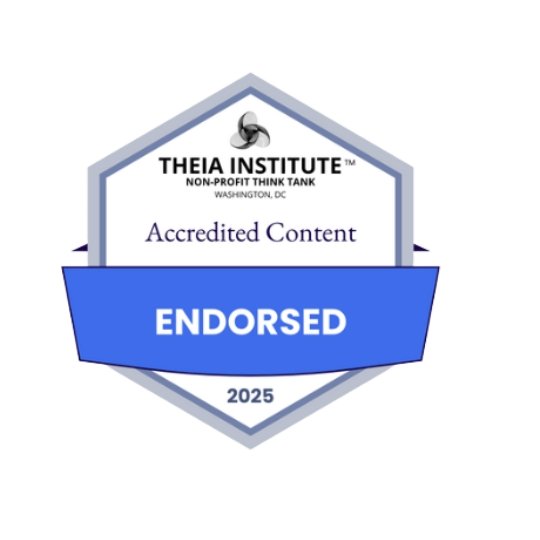
“The XPROMOS AI training program delivers productivity gains beyond traditional business functions like IT, BI, and analytics. It democratizes AI productivity while increasing business ROI so that everyone wins,” said Executive Director, Todd A. Jacobs.
XPROMOS launches the first Theia Institute-endorsed certified AI training program designed to build AI fluency across non-technical teams in marketing, sales, HR, and finance. This premier global endorsement supports XPROMOS’ certified AI training that turns curiosity into capability by guiding participants to create scalable AI pilots that drive measurable value. The program aligns with the Washington DC-based nonprofit think tank’s mission of responsible, ethical, and practical AI adoption.

LOS ANGELES, CA – XPROMOS, a longtime leader in revenue‑driving strategy for enterprise brands, announces a premier global endorsement by Washington DC’s Theia Institute, a non-profit emerging technologies think tank shaping the standards of responsible AI use in business and policy. XPROMOS now offers an official Theia Institute certification for AI Fluency to qualified AI Training participants in their respective domains, including marketing, sales, operations, HR, finance, and more.
“This program turns dabblers into AI Fluents: people who use AI with clarity, not just curiosity,” said co-founder Yvette Brown.
“We built it to teach AI fluency and drive business value across functions, grounded in real understanding of governance, bias, and responsible use. Theia’s endorsement validates what we’ve always believed: AI literacy isn’t enough. If teams are going to extract real value responsibly, they need fluency, so they can think with the tech, not just use it.” Yvette Brown added, “When humans don’t understand AI’s capabilities and its limitations, they create unnecessary risk. This program changes that,” concluded Yvette Brown.
XPROMOS’ training is one of the first programs of its kind to be endorsed by Theia Institute, making it a trusted on‑ramp to strategic, ethical AI integration for non‑technical professionals. Participants who complete the program are awarded a credential that aligns directly with their business function, offering credibility, clarity, and a new kind of career capital.
“We’re proud to provide our most exclusive endorsement seal to XPROMOS’ AI training materials and educational methodology as it aligns with our think tank’s focus at the intersection of people and technology of preparing people for today’s evolving workplace.” stated Executive Director, Todd A. Jacobs.
“AI Fluency credentials ensure that people in marketing, sales, and HR also benefit from the growing workplace adoption of AI tools. The XPROMOS AI training program delivers productivity gains beyond traditional business functions like IT, BI, and analytics. It democratizes AI productivity while increasing business ROI so that everyone wins.”
— Todd A. Jacobs, Executive Director
Theia Institute™ Non-Profit Think Tank
The program was built for professionals navigating the AI shift without hype; early adopters in business units who need capability, not just content. With Theia’s endorsement, XPROMOS positions its AI training not just as a course, but as a new standard for responsible intelligence.
About XPROMOS
XPROMOS is an AI Fluency accelerator built by enterprise marketing veterans. With decades of experience driving results at scale, the company now helps professionals across industries gain the skills and strategic perspective needed to lead with AI. Through its Theia Institute-endorsed training, XPROMOS empowers creators and business leaders to earn real certification as Generative AI Practitioners, making them relevant, resilient, and ready for what’s next.
About Theia Institute
Theia Institute is a nonprofit AI governance, ethics, and cybersecurity think tank based in Washington, D.C., dedicated to advancing policy and decision-making through rigorous research and comprehensive analysis. Its commitment to an ethical, balanced, and unbiased approach sets it apart in the realm of business privacy, AI governance, and public policy.
Media Contact
Company Name: XPROMOS
Contact Person: Yvette Brown, XPROMOS Co-Founder
Email: Send Email
Phone: 7143370371
City: Laguna Hills
State: California
Country: United States
Website: https://xpromos.com
Books, Courses & Certifications
Detect Amazon Bedrock misconfigurations with Datadog Cloud Security
This post was co-written with Nick Frichette and Vijay George from Datadog.
As organizations increasingly adopt Amazon Bedrock for generative AI applications, protecting against misconfigurations that could lead to data leaks or unauthorized model access becomes critical. The AWS Generative AI Adoption Index, which surveyed 3,739 senior IT decision-makers across nine countries, revealed that 45% of organizations selected generative AI tools as their top budget priority in 2025. As more AWS and Datadog customers accelerate their adoption of AI, building AI security into existing processes will become essential, especially as more stringent regulations emerge. But looking at AI risks in a silo isn’t enough; AI risks must be contextualized alongside other risks such as identity exposures and misconfigurations. The combination of Amazon Bedrock and Datadog’s comprehensive security monitoring helps organizations innovate faster while maintaining robust security controls.
Amazon Bedrock delivers enterprise-grade security by incorporating built-in protections across data privacy, access controls, network security, compliance, and responsible AI safeguards. Customer data is encrypted both in transit using TLS 1.2 or above and at rest with AWS Key Management Service (AWS KMS), and organizations have full control over encryption keys. Data privacy is central: your input, prompts, and outputs are not shared with model providers nor used to train or improve foundation models (FMs). Fine-tuning and customizations occur on private copies of models, providing data confidentiality. Access is tightly governed through AWS Identity and Access Management (IAM) and resource-based policies, supporting granular authorization for users and roles. Amazon Bedrock integrates with AWS PrivateLink and supports virtual private cloud (VPC) endpoints for private, internal communication, so traffic doesn’t leave the Amazon network. The service complies with key industry standards such as ISO, SOC, CSA STAR, HIPAA eligibility, GDPR, and FedRAMP High, making it suitable for regulated industries. Additionally, Amazon Bedrock includes configurable guardrails to filter sensitive or harmful content and promote responsible AI use. Security is structured under the AWS Shared Responsibility Model, where AWS manages infrastructure security and customers are responsible for secure configurations and access controls within their Amazon Bedrock environment.
Building on these robust AWS security features, Datadog and AWS have partnered to provide a holistic view of AI infrastructure risks, vulnerabilities, sensitive data exposure, and other misconfigurations. Datadog Cloud Security employs both agentless and agent-based scanning to help organizations identify, prioritize, and remediate risks across cloud resources. This integration helps AWS users prioritize risks based on business criticality, with security findings enriched by observability data, thereby enhancing their overall security posture in AI implementations.
We’re excited to announce new security capabilities in Datadog Cloud Security that can help you detect and remediate Amazon Bedrock misconfigurations before they become security incidents. This integration helps organizations embed robust security controls and secure their use of the powerful capabilities of Amazon Bedrock by offering three critical advantages: holistic AI security by integrating AI security into your broader cloud security strategy, real-time risk detection through identifying potential AI-related security issues as they emerge, and simplified compliance to help meet evolving AI regulations with pre-built detections.
AWS and Datadog: Empowering customers to adopt AI securely
The partnership between AWS and Datadog is focused on helping customers operate their cloud infrastructure securely and efficiently. As organizations rapidly adopt AI technologies, extending this partnership to include Amazon Bedrock is a natural evolution. Amazon Bedrock is a fully managed service that makes high-performing FMs from leading AI companies and Amazon available through a unified API, making it an ideal starting point for Datadog’s AI security capabilities.
The decision to prioritize Amazon Bedrock integration is driven by several factors, including strong customer demand, comprehensive security needs, and the existing integration foundation. With over 900 integrations and a partner-built Marketplace, Datadog’s long-standing partnership with AWS and deep integration capabilities have helped Datadog quickly develop comprehensive security monitoring for Amazon Bedrock while using their existing cloud security expertise.
Throughout Q4 2024, Datadog Security Research observed increasing threat actor interest in cloud AI environments, making this integration particularly timely. By combining the powerful AI capabilities of AWS with Datadog’s security expertise, you can safely accelerate your AI adoption while maintaining robust security controls.
How Datadog Cloud Security helps secure Amazon Bedrock resources
After adding the AWS integration to your Datadog account and enabling Datadog Cloud Security, Datadog Cloud Security continuously monitors your AWS environment, identifying misconfigurations, identity risks, vulnerabilities, and compliance violations. These detections use the Datadog Severity Scoring system to prioritize them based on infrastructure context. The scoring considers a variety of variables, including if the resource is in production, is publicly accessible, or has access to sensitive data. This multi-layer analysis can help you reduce noise and focus your attention to the most critical misconfigurations by considering runtime behavior.
Partnering with AWS, Datadog is excited to offer detections for Datadog Cloud Security customers, such as:
- Amazon Bedrock custom models should not output model data to publicly accessible S3 buckets
- Amazon Bedrock custom models should not train from publicly writable S3 buckets
- Amazon Bedrock guardrails should have a prompt attack filter enabled and block prompt attacks at high sensitivity
- Amazon Bedrock agent guardrails should have the sensitive information filter enabled and block highly sensitive PII entities
Detect AI misconfigurations with Datadog Cloud Security
To understand how these detections can help secure your Amazon Bedrock infrastructure, let’s look at a specific use case, in which Amazon Bedrock custom models should not train from publicly writable Amazon Simple Storage Service (Amazon S3) buckets.
With Amazon Bedrock, you can customize AI models by fine-tuning on domain specific data. To do this, that data is stored in an S3 bucket. Threat actors are constantly evaluating the configuration of S3 buckets, looking for the potential to access sensitive data or even the ability to write to S3 buckets.
If a threat actor finds an S3 bucket that was misconfigured to permit public write access, and that same bucket contained data that was used to train an AI model, a bad actor could poison that dataset and introduce malicious behavior or output to the model. This is known as a data poisoning attack.
Normally, detecting these types of misconfigurations requires multiple steps: one to identify the S3 bucket misconfigured with write access, and one to identify that the bucket is being used by Amazon Bedrock. With Datadog Cloud Security, this detection is one of hundreds that are activated out of the box.
In the Datadog Cloud Security system, you can view this issue alongside surrounding infrastructure using Cloud Map. This provides live diagrams of your cloud architecture, as shown in the following screenshot. AI risks are then contextualized alongside sensitive data exposure, identity risks, vulnerabilities, and other misconfigurations to give you a 360-view of risks.

For example, you might see that your application is using Anthropic’s Claude 3.7 on Amazon Bedrock and accessing training or prompt data stored in an S3 bucket that also has public write access. This could inadvertently impact model integrity by introducing unapproved data to the large language model (LLM), so you will want to update this configuration. Though basic, the first step for most security initiatives is identifying the issue. With agentless scanning, Datadog scans your AWS environment at intervals between 15 minutes and 2 hours, so users can identify misconfigurations as they are introduced to their environment. The next step is to remediate this risk. Datadog Cloud Security offers automatically generated remediation guidance, specifically for each risk (see the following screenshot). You will get a step-by-step explanation of how to fix each finding. In this situation, we can remediate this issue by modifying the S3 bucket’s policy, helping prevent public write access. You can do this directly in AWS, create a JIRA ticket, or use the built-in workflow automation tools. From here, you can apply remediation steps directly within Datadog and confirm that the misconfiguration has been resolved.

Resolving this issue will positively impact your compliance posture, as illustrated by the posture score in Datadog Cloud Security, helping teams meet internal benchmarks and regulatory standards. Teams can also create custom frameworks or iterate on existing ones for tailored compliance controls.

As generative AI is embraced across industries, the regulatory environment will evolve. Datadog will continue partnering with AWS to expand their detection library and support secure AI adoption and compliance.
How Datadog Cloud Security detects misconfigurations in your cloud environment
You can deploy Datadog Cloud Security either with the Datadog agent, agentlessly, or both to maximize security coverage in your cloud environment. Datadog customers can start monitoring their AWS accounts for misconfigurations by first adding the AWS integration to Datadog. This enables Datadog to crawl cloud resources in customer AWS accounts.
As the Datadog system finds resources, it runs through a catalog of hundreds of out-of-the-box detection rules against these resources, looking for misconfigurations and threat paths that adversaries can exploit.
Secure your AI infrastructure with Datadog
Misconfigurations in AI systems can be risky, but with the right tools, you can have the visibility and context needed to manage them. With Datadog Cloud Security, teams gain visibility into these risks, detect threats early, and remediate issues with confidence. In addition, Datadog has also released numerous agentic AI security features, designed to help teams gain visibility into the health and security of critical AI workload, which includes new announcements made to Datadog’s LLM observability features.
Lastly, Datadog announced Bits AI Security Analyst alongside other Bits AI agents at DASH. Included as part of Cloud SIEM, Bits is an agentic AI security analyst that automates triage for AWS CloudTrail signals. Bits investigates each alert like a seasoned analyst: pulling in relevant context from across your Datadog environment, annotating key findings, and offering a clear recommendation on whether the signal is likely benign or malicious. By accelerating triage and surfacing real threats faster, Bits helps reduce mean time to remediation (MTTR) and frees analysts to focus on important threat hunting and response initiatives. This helps across different threats, including AI-related threats.
To learn more about how Datadog helps secure your AI infrastructure, see Monitor Amazon Bedrock with Datadog or check out our security documentation. If you’re not already using Datadog, you can get started with Datadog Cloud Security with a 14-day free trial.
About the Authors
 Nina Chen is a Customer Solutions Manager at AWS specializing in leading software companies to use the power of the AWS Cloud to accelerate their product innovation and growth. With over 4 years of experience working in the strategic independent software vendor (ISV) vertical, Nina enjoys guiding ISV partners through their cloud transformation journeys, helping them optimize their cloud infrastructure, driving product innovation, and delivering exceptional customer experiences.
Nina Chen is a Customer Solutions Manager at AWS specializing in leading software companies to use the power of the AWS Cloud to accelerate their product innovation and growth. With over 4 years of experience working in the strategic independent software vendor (ISV) vertical, Nina enjoys guiding ISV partners through their cloud transformation journeys, helping them optimize their cloud infrastructure, driving product innovation, and delivering exceptional customer experiences.
 Sujatha Kuppuraju is a Principal Solutions Architect at AWS, specializing in cloud and generative AI security. She collaborates with software companies’ leadership teams to architect secure, scalable solutions on AWS and guide strategic product development. Using her expertise in cloud architecture and emerging technologies, Sujatha helps organizations optimize offerings, maintain robust security, and bring innovative products to market in an evolving tech landscape.
Sujatha Kuppuraju is a Principal Solutions Architect at AWS, specializing in cloud and generative AI security. She collaborates with software companies’ leadership teams to architect secure, scalable solutions on AWS and guide strategic product development. Using her expertise in cloud architecture and emerging technologies, Sujatha helps organizations optimize offerings, maintain robust security, and bring innovative products to market in an evolving tech landscape.
 Nick Frichette is a Staff Security Researcher for Cloud Security Research at Datadog.
Nick Frichette is a Staff Security Researcher for Cloud Security Research at Datadog.
 Vijay George is a Product Manager for AI Security at Datadog.
Vijay George is a Product Manager for AI Security at Datadog.
Books, Courses & Certifications
Set up custom domain names for Amazon Bedrock AgentCore Runtime agents
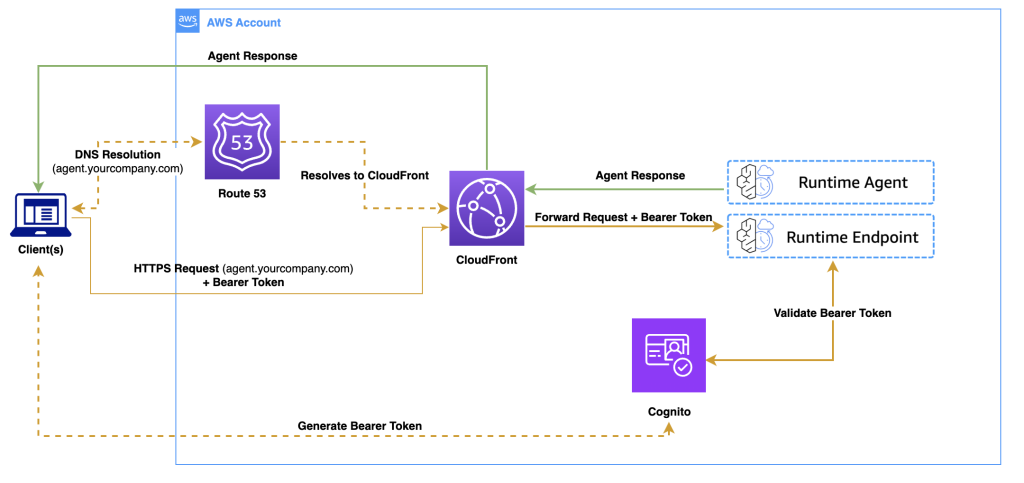
When deploying AI agents to Amazon Bedrock AgentCore Runtime (currently in preview), customers often want to use custom domain names to create a professional and seamless experience.
By default, AgentCore Runtime agents use endpoints like https://bedrock-agentcore.{region}.amazonaws.com/runtimes/{EncodedAgentARN}/invocations.
In this post, we discuss how to transform these endpoints into user-friendly custom domains (like https://agent.yourcompany.com) using Amazon CloudFront as a reverse proxy. The solution combines CloudFront, Amazon Route 53, and AWS Certificate Manager (ACM) to create a secure, scalable custom domain setup that works seamlessly with your existing agents.
Benefits of Amazon Bedrock AgentCore Runtime
If you’re building AI agents, you have probably wrestled with hosting challenges: managing infrastructure, handling authentication, scaling, and maintaining security. Amazon Bedrock AgentCore Runtime helps address these problems.
Amazon Bedrock AgentCore Runtime is framework agnostic; you can use it with LangGraph, CrewAI, Strands Agents, or custom agents you have built from scratch. It supports extended execution times up to 8 hours, perfect for complex reasoning tasks that traditional serverless functions can’t handle. Each user session runs in its own isolated microVM, providing security that’s crucial for enterprise applications.
The consumption-based pricing model means you only pay for what you use, not what you provision. And unlike other hosting solutions, Amazon Bedrock AgentCore Runtime includes built-in authentication and specialized observability for AI agents out of the box.
Benefits of custom domains
When using Amazon Bedrock AgentCore Runtime with Open Authorization (OAuth) authentication, your applications make direct HTTPS requests to the service endpoint. Although this works, custom domains offer several benefits:
- Custom branding – Client-side applications (web browsers, mobile apps) display your branded domain instead of AWS infrastructure details in network requests
- Better developer experience – Development teams can use memorable, branded endpoints instead of copying and pasting long AWS endpoints across code bases and configurations
- Simplified maintenance – Custom domains make it straightforward to manage endpoints when deploying multiple agents or updating configurations across environments
Solution overview
In this solution, we use CloudFront as a reverse proxy to transform requests from your custom domain into Amazon Bedrock AgentCore Runtime API calls. Instead of using the default endpoint, your applications can make requests to a user-friendly URL like https://agent.yourcompany.com/.
The following diagram illustrates the solution architecture.
The workflow consists of the following steps:
- A client application authenticates with Amazon Cognito and receives a bearer token.
- The client makes an HTTPS request to your custom domain.
- Route 53 resolves the DNS request to CloudFront.
- CloudFront forwards the authenticated request to the Amazon Bedrock Runtime agent.
- The agent processes the request and returns the response through the same path.
You can use the same CloudFront distribution to serve both your frontend application and backend agent endpoints, avoiding cross-origin resource sharing (CORS) issues because everything originates from the same domain.
Prerequisites
To follow this walkthrough, you must have the following in place:
Although Amazon Bedrock AgentCore Runtime can be in other supported AWS Regions, CloudFront requires SSL certificates to be in the us-east-1 Region.
You can choose from the following domain options:
- Use an existing domain – Add a subdomain like
agent.yourcompany.com - Register a new domain – Use Route 53 to register a domain if you don’t have one
- Use the default URL from CloudFront – No domain registration or configuration required
Choose the third option if you want to test the solution quickly before setting up a custom domain.
Create an agent with inbound authentication
If you already have an agent deployed with OAuth authentication, you can skip to the next section to set up the custom domain. Otherwise, follow these steps to create a new agent using Amazon Cognito as your OAuth provider:
- Create a new directory for your agent with the following structure:
- Create the main agent code in
agent_example.py:
- Add dependencies to
requirements.txt:
- Run the following commands to create an Amazon Cognito user pool and test user:
- Deploy the agent using the Amazon Bedrock AgentCore command line interface (CLI) provided by the starter toolkit:
Make note of your agent runtime Amazon Resource Name (ARN) after deployment. You will need this for the custom domain configuration.
For additional examples and details, see Authenticate and authorize with Inbound Auth and Outbound Auth.
Set up the custom domain solution
Now let’s implement the custom domain solution using the AWS CDK. This section shows you how to create the CloudFront distribution that proxies your custom domain requests to Amazon Bedrock AgentCore Runtime endpoints.
- Create a new directory and initialize an AWS CDK project:
- Encode the agent ARN and prepare the CloudFront origin configuration:
If your frontend application runs on a different domain than your agent endpoint, you must configure CORS headers. This is common if your frontend is hosted on a different domain (for example, https://app.yourcompany.com calling https://agent.yourcompany.com), or if you’re developing locally (for example, http://localhost:3000 calling your production agent endpoint).
- To handle CORS requirements, create a CloudFront response headers policy:
- Create a CloudFront distribution to act as a reverse proxy for your agent endpoints:
Set cache_policy=CachePolicy.CACHING_DISABLED to make sure your agent responses remain dynamic and aren’t cached by CloudFront.
- If you’re using a custom domain, add an SSL certificate and DNS configuration to your stack:
The following code is the complete AWS CDK stack that combines all the components:
- Configure the AWS CDK
appentry point:
Deploy your custom domain
Now you can deploy the solution and verify it works with both custom and default domains. Complete the following steps:
- Update the following values in
agentcore_custom_domain_stack.py:- Your Amazon Bedrock AgentCore Runtime ARN
- Your domain name (if using a custom domain)
- Your hosted zone ID (if using a custom domain)
- Deploy using the AWS CDK:
Test your endpoint
After you deploy the custom domain, you can test your endpoints using either the custom domain or the CloudFront default domain.First, get a JWT token from Amazon Cognito:
Use the following code to test with your custom domain:
Alternatively, use the following code to test with the CloudFront default domain:
Considerations
As you implement this solution in production, the following are some important considerations:
- Cost implications – CloudFront adds costs for data transfer and requests. Review Amazon CloudFront pricing to understand the impact for your usage patterns.
- Security enhancements – Consider implementing the following security measures:
- AWS WAF rules to help protect against common web exploits.
- Rate limiting to help prevent abuse.
- Geo-restrictions if your agent should only be accessible from specific Regions.
- Monitoring – Enable CloudFront access logs and set up Amazon CloudWatch alarms to monitor error rates, latency, and request volume.
Clean up
To avoid ongoing costs, delete the resources when you no longer need them:
You might need to manually delete the Route 53 hosted zones and ACM certificates from their respective service consoles.
Conclusion
In this post, we showed you how to create custom domain names for your Amazon Bedrock AgentCore Runtime agent endpoints using CloudFront as a reverse proxy. This solution provides several key benefits: simplified integration for development teams, custom domains that align with your organization, cleaner infrastructure abstraction, and straightforward maintenance when endpoints need updates. By using CloudFront as a reverse proxy, you can also serve both your frontend application and backend agent endpoints from the same domain, avoiding common CORS challenges.
We encourage you to explore this solution further by adapting it to your specific needs. You might want to enhance it with additional security features, set up monitoring, or integrate it with your existing infrastructure.
To learn more about building and deploying AI agents, see the Amazon Bedrock AgentCore Developer Guide. For advanced configurations and best practices with CloudFront, refer to the Amazon CloudFront documentation. You can find detailed information about SSL certificates in the AWS Certificate Manager documentation, and domain management in the Amazon Route 53 documentation.
Amazon Bedrock AgentCore is currently in preview and subject to change. Standard AWS pricing applies to additional services used, such as CloudFront, Route 53, and Certificate Manager.
About the authors
 Rahmat Fedayizada is a Senior Solutions Architect with the AWS Energy and Utilities team. He works with energy companies to design and implement scalable, secure, and highly available architectures. Rahmat is passionate about translating complex technical requirements into practical solutions that drive business value.
Rahmat Fedayizada is a Senior Solutions Architect with the AWS Energy and Utilities team. He works with energy companies to design and implement scalable, secure, and highly available architectures. Rahmat is passionate about translating complex technical requirements into practical solutions that drive business value.
 Paras Bhuva is a Senior Manager of Solutions Architecture at AWS, where he leads a team of solution architects helping energy customers innovate and accelerate their transformation. Having started as a Solution Architect in 2012, Paras is passionate about architecting scalable solutions and building organizations focused on application modernization and AI initiatives.
Paras Bhuva is a Senior Manager of Solutions Architecture at AWS, where he leads a team of solution architects helping energy customers innovate and accelerate their transformation. Having started as a Solution Architect in 2012, Paras is passionate about architecting scalable solutions and building organizations focused on application modernization and AI initiatives.
-
Tools & Platforms3 weeks ago
Building Trust in Military AI Starts with Opening the Black Box – War on the Rocks
-

 Business2 days ago
Business2 days agoThe Guardian view on Trump and the Fed: independence is no substitute for accountability | Editorial
-

 Ethics & Policy1 month ago
Ethics & Policy1 month agoSDAIA Supports Saudi Arabia’s Leadership in Shaping Global AI Ethics, Policy, and Research – وكالة الأنباء السعودية
-

 Events & Conferences3 months ago
Events & Conferences3 months agoJourney to 1000 models: Scaling Instagram’s recommendation system
-

 Jobs & Careers2 months ago
Jobs & Careers2 months agoMumbai-based Perplexity Alternative Has 60k+ Users Without Funding
-

 Funding & Business2 months ago
Funding & Business2 months agoKayak and Expedia race to build AI travel agents that turn social posts into itineraries
-

 Education2 months ago
Education2 months agoVEX Robotics launches AI-powered classroom robotics system
-

 Podcasts & Talks2 months ago
Podcasts & Talks2 months agoHappy 4th of July! 🎆 Made with Veo 3 in Gemini
-

 Podcasts & Talks2 months ago
Podcasts & Talks2 months agoOpenAI 🤝 @teamganassi
-

 Mergers & Acquisitions2 months ago
Mergers & Acquisitions2 months agoDonald Trump suggests US government review subsidies to Elon Musk’s companies





















